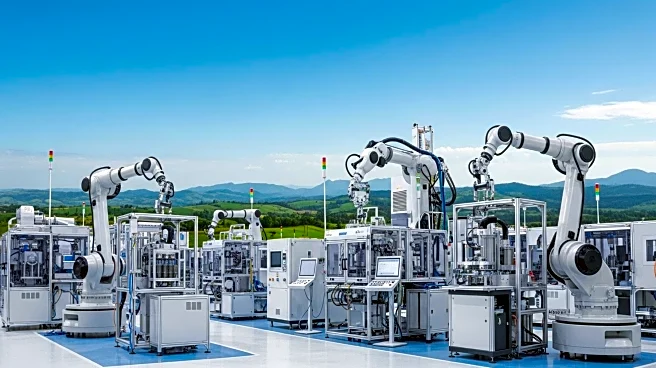What's Happening?
Eli Lilly has announced plans to build a $5 billion manufacturing plant in Richmond, Virginia, as part of its $50 billion capital deployment strategy across the United States. The facility, which will be Eli Lilly's first bioconjugate production plant, is expected to be completed within the next five years. The plant will cover more than 200,000 square feet and will incorporate advanced technologies such as machine learning, artificial intelligence, and automated systems. Bioconjugate drugs are designed to target diseased cells directly, enhancing treatment efficacy while minimizing damage to healthy tissues. This type of therapy is primarily used in cancer treatment but is also being explored for autoimmune diseases. The Richmond site spans 227 acres and is currently owned by insurance company Markel. Eli Lilly's investment in new plants and site expansions since 2020 totals $23 billion, with plans to invest an additional $27 billion over the next five years.
Why It's Important?
The construction of this new facility is significant for several reasons. It represents a substantial investment in the U.S. pharmaceutical manufacturing sector, potentially boosting local economies and creating jobs. The focus on bioconjugate drugs highlights a growing trend in precision medicine, which aims to improve treatment outcomes by targeting specific disease mechanisms. This development could enhance Eli Lilly's competitive position in the pharmaceutical industry, particularly in the oncology and autoimmune disease markets. Additionally, the integration of advanced technologies in the manufacturing process may set new standards for efficiency and innovation in drug production.
What's Next?
As Eli Lilly progresses with its construction plans, the company will likely engage with local authorities and stakeholders to ensure smooth development. The project may attract interest from other pharmaceutical companies considering similar investments in advanced manufacturing technologies. The Richmond facility's completion will be closely watched by industry analysts and investors, as it could influence future trends in drug manufacturing and distribution. Furthermore, the success of this project may encourage Eli Lilly to pursue additional bioconjugate production facilities, potentially expanding its footprint in other regions.








